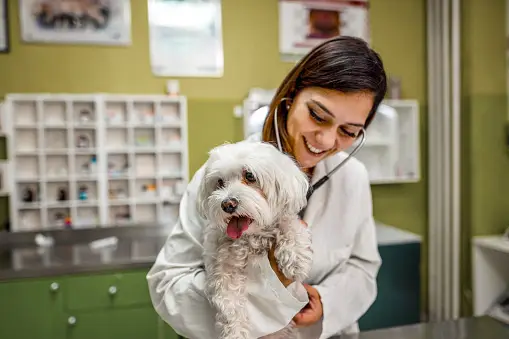The importance of regular vet check-ups for dogs cannot be overstated when it comes to ensuring your furry friend’s overall well-being. These check-ups are essential for early detection and prevention of potential health issues that may otherwise go unnoticed. By providing comprehensive examinations, vaccinations, and necessary treatments, veterinarians play a crucial role in maintaining your dog’s optimal health and happiness. In this article, we will delve into the significance of vet check-ups and explore how they contribute to the long-term well-being of your beloved canine companion.
Why Regular Vet Check-ups are Important for Dogs
Regular vet check-ups are crucial for ensuring the well-being and good health of your beloved canine companion. These check-ups provide a range of benefits, including prevention and early detection of health issues, monitoring overall health and wellness, as well as maintaining vaccination and parasite control.
Prevention and Early Detection of Health Issues
One of the primary reasons why regular vet check-ups are essential for dogs is the prevention and early detection of health issues. Dogs, just like humans, can develop various health conditions that may go unnoticed without regular check-ups. During these visits, veterinarians conduct thorough physical examinations and screenings to identify any potential health problems. They may check for signs of dental issues, heart problems, obesity, joint pain, or other conditions that require immediate attention. By catching these issues early on, veterinarians can provide timely treatment and prevent them from escalating into more serious and costly health concerns.
Monitoring Overall Health and Wellness
Regular vet check-ups allow for the monitoring of your dog’s overall health and wellness. These visits provide an opportunity for veterinarians to assess your dog’s weight, body condition, and overall physical fitness. They can evaluate if your dog is receiving proper nutrition, discuss dietary changes if necessary, and offer guidance on exercise and weight management. Furthermore, regular check-ups allow veterinarians to track your dog’s growth and development, ensuring they are reaching their milestones and maintaining optimal health throughout their life.
Maintaining Vaccination and Parasite Control
Another crucial aspect of regular vet check-ups is the maintenance of vaccination and parasite control. Vaccinations protect dogs from various infectious diseases, such as rabies, distemper, parvovirus, and hepatitis. During vet check-ups, veterinarians can administer or update necessary vaccinations based on your dog’s age, lifestyle, and regional risks. Additionally, these visits are an opportunity to discuss and implement effective parasite control measures. Veterinarians can recommend appropriate flea, tick, and heartworm preventatives, ensuring your dog remains protected against these common and potentially harmful parasites.
In conclusion, regular vet check-ups are of utmost importance for the well-being and overall health of your dog. These visits enable the prevention and early detection of health issues, the monitoring of your dog’s overall health and wellness, as well as the maintenance of vaccination and parasite control. By prioritizing regular vet check-ups, you are ensuring that your furry friend receives the necessary care and attention they need to live a long, happy, and healthy life.
What to Expect During a Vet Check-up
Regular vet check-ups are essential to ensure the overall well-being of your beloved furry friend. During these visits, veterinarians conduct a thorough examination of your dog, perform necessary diagnostic tests and screenings, and engage in discussions to provide you with recommendations for your dog’s health. Let’s take a closer look at what you can expect during a vet check-up.
Physical Examination
One of the primary components of a vet check-up is a comprehensive physical examination. The veterinarian will carefully examine your dog from head to tail, assessing various aspects of their health. This examination includes:
- Checking Vital Signs: The veterinarian will measure your dog’s heart rate, respiratory rate, and body temperature to ensure they are within the normal range. Deviations from the normal range may indicate an underlying health issue.
- Assessing Body Condition: The veterinarian will evaluate your dog’s body condition, including their weight, muscle tone, and overall appearance. This helps determine if your dog is maintaining a healthy weight and if any dietary adjustments are necessary.
- Skin and Coat Evaluation: The veterinarian will inspect your dog’s skin and coat for signs of allergies, infections, parasites, or any abnormalities. They will also assess the condition of the coat, looking for signs of excessive shedding, dryness, or oiliness.
- Eyes, Ears, and Nose Examination: The veterinarian will examine your dog’s eyes for any signs of inflammation, discharge, or abnormalities. They will also check the ears for signs of infection, ear mites, or excessive wax buildup. Additionally, the nose will be assessed for any nasal discharge or abnormalities.
- Oral Health Check: The veterinarian will examine your dog’s mouth, teeth, and gums to determine the overall oral health. They will look for signs of dental disease, tartar buildup, gum inflammation, or any other oral issues that may require attention.
Diagnostic Tests and Screening
Depending on your dog’s age, breed, and medical history, the veterinarian may recommend specific diagnostic tests and screenings to assess their overall health and detect any underlying conditions. These may include:
- Blood Tests: Bloodwork helps evaluate your dog’s organ function, detect infections, check for abnormalities in blood cell counts, and assess the overall health of your dog’s internal systems.
- Urinalysis: A urinalysis provides valuable information about your dog’s kidney function, urinary tract health, and can detect conditions such as urinary tract infections or kidney disease.
- Fecal Examination: A fecal examination helps identify any intestinal parasites or bacterial infections that may be affecting your dog’s gastrointestinal health.
- X-rays or Ultrasound: If necessary, the veterinarian may recommend imaging tests such as X-rays or ultrasounds to get a closer look at your dog’s bones, organs, or tissues and diagnose any potential issues.
Discussion and Recommendations
After completing the physical examination and diagnostic tests, the veterinarian will discuss their findings with you. They will provide recommendations based on the examination results and address any concerns or questions you may have. This discussion may cover various aspects, including:
- Vaccination Schedule: The veterinarian will review your dog’s vaccination history and recommend any necessary vaccinations or boosters to keep them protected against common diseases.
- Parasite Prevention: They may discuss flea, tick, and heartworm prevention methods to ensure your dog remains protected from these external and internal parasites.
- Nutrition and Diet: Based on your dog’s age, breed, and health condition, the veterinarian may provide dietary recommendations to support their overall health and address any specific nutritional needs.
- Exercise and Physical Activity: The veterinarian may suggest appropriate exercise routines or modifications based on your dog’s age, breed, and physical condition to promote their well-being and prevent obesity.
- Additional Care or Treatment: If any health issues or concerns are identified during the check-up, the veterinarian may recommend further tests, treatments, or referrals to specialists for specialized care.
Regular vet check-ups not only help identify potential health issues early on but also provide an opportunity for you to discuss any concerns and receive professional guidance on maintaining your dog’s well-being. By staying proactive about your dog’s health, you can ensure they live a happy and healthy life.
Frequency of Vet Check-ups for Dogs
Puppyhood and Early Stages of Life
Regular vet check-ups are essential for puppies and dogs in their early stages of life. During this period, puppies are more vulnerable to diseases and health issues, and their immune systems are still developing. As a responsible dog owner, you should schedule frequent visits to the vet to ensure your puppy’s well-being.
In general, puppies should have a vet check-up every 3 to 4 weeks until they are about 16 weeks old. These visits allow the vet to monitor their growth, administer necessary vaccinations, and address any potential health concerns promptly. Additionally, the vet can provide guidance on proper nutrition, training, and socialization to give your puppy the best start in life.
Adult and Middle-aged Dogs
Once your dog reaches adulthood, regular vet check-ups should continue, although the frequency may decrease compared to puppyhood. Adult dogs generally require a check-up once a year, although certain factors like breed, size, and pre-existing health conditions may warrant more frequent visits.
Annual check-ups are crucial for maintaining your adult dog’s overall well-being and detecting any underlying health issues early on. The vet will assess your dog’s weight, dental health, heart function, and perform necessary blood tests to screen for common conditions like heartworm disease or tick-borne illnesses. These check-ups also allow the vet to update vaccinations and discuss preventive measures such as flea and tick control.
Senior Dogs and Aging-related Concerns
As your dog enters their senior years, regular vet check-ups become even more critical. Senior dogs are more prone to age-related health problems such as arthritis, dental disease, and organ dysfunction. By scheduling check-ups every 6 months, you can ensure that these issues are promptly addressed and managed.
During senior dog check-ups, the vet will conduct a thorough examination, including joint mobility assessment, blood work, and a comprehensive assessment of their overall health. These visits allow for the early detection of age-related concerns, enabling timely interventions and treatment plans tailored to your dog’s specific needs. Additionally, the vet may recommend dietary adjustments, supplements, or pain management strategies to enhance your senior dog’s quality of life.
In conclusion, the frequency of vet check-ups for dogs varies depending on their life stage. Regular visits during puppyhood, annual check-ups during adulthood, and more frequent visits for senior dogs are important to ensure your dog’s overall well-being. By working closely with your vet and following their recommendations, you can provide the best possible care for your furry companion at every stage of their life.
Choosing the Right Veterinarian
When it comes to ensuring your dog’s well-being, choosing the right veterinarian is of utmost importance. A highly qualified and experienced vet can provide the necessary care and attention your furry friend deserves. Here are some essential factors to consider when selecting a veterinarian for your dog:
Credentials and Experience
First and foremost, it is crucial to check the credentials and experience of potential veterinarians. Look for a professional who has obtained the necessary qualifications and has a valid license to practice veterinary medicine. Additionally, consider their expertise in dealing with dogs specifically. A veterinarian with experience in treating dogs will be more familiar with their unique health issues, behavior, and specific needs.
Availability and Accessibility
Another important aspect to consider is the availability and accessibility of the veterinarian. Ensure that their clinic is conveniently located, preferably near your home. This will make it easier for you to take your dog for regular check-ups and emergency visits, if needed. Additionally, inquire about their working hours and if they offer appointments during weekends or evenings, as it can be beneficial for individuals with busy schedules.
Compatibility and Personal Connection
The compatibility and personal connection between your dog and the veterinarian are crucial for a positive and stress-free experience. Dogs, much like humans, can have varying temperaments and preferences. It is essential to find a veterinarian who can establish a good rapport with your dog, making them feel comfortable during visits. A vet who genuinely cares for animals and shows patience, kindness, and attentiveness will go a long way in ensuring your dog’s well-being.
In conclusion, selecting the right veterinarian for your dog involves considering their credentials and experience, availability and accessibility, as well as establishing a compatible and personal connection. Taking the time to choose a veterinarian who meets these criteria will contribute to your dog’s overall health and happiness.
Preparing Your Dog for a Vet Check-up
A vet check-up is an essential part of ensuring your dog’s well-being. To make the most out of the visit, it is crucial to prepare your dog beforehand. Here are some steps to help you get ready:
Scheduling an Appointment
The first step in preparing for a vet check-up is to schedule an appointment. Contact your veterinarian’s office and find a suitable time for the visit. Consider choosing a time when your dog is usually calm and relaxed to make the experience less stressful.
Gathering Relevant Information
Before the vet check-up, gather all the necessary information about your dog’s health history. This includes any previous medical records, vaccination details, and information about any ongoing medications or treatments. Providing this information to the veterinarian will help them understand your dog’s medical background better.
Transportation and Comfort
Transporting your dog to the vet’s office requires careful planning to ensure their comfort and safety. If your dog gets anxious during car rides, consider using a secure and comfortable carrier. Make sure your dog is securely restrained in the car to prevent any accidents during the journey.
To make the overall experience less stressful, create a calm and soothing environment for your dog. Bring along their favorite blanket or toy to provide a sense of familiarity and comfort. Additionally, avoid feeding your dog right before the appointment to prevent any potential stomach discomfort.
By following these steps to prepare your dog for a vet check-up, you can ensure a smoother and more productive visit. Remember, the well-being of your furry friend is in your hands, and regular check-ups are vital for their overall health.
Regular vet check-ups are essential for maintaining the well-being of your beloved canine companion. These check-ups not only provide preventative care but also allow for early detection and treatment of any potential health issues. By ensuring that your dog receives routine vaccinations, dental exams, and overall physical examinations, you are taking the necessary steps to keep them healthy and happy. Remember, a healthy dog is a happy dog, and regular vet check-ups are a crucial part of responsible pet ownership. So, be proactive and schedule those regular check-ups to ensure your dog’s well-being for years to come.







